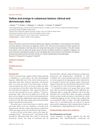Search
forLearn
1 / 1 resultsResearch
5 / 1000+ resultsresearch The Role of Retinoids in the Management of Cutaneous Conditions in Black Individuals
Retinoids help manage skin conditions in black individuals.

research Illuminating Microflora: Shedding Light on the Potential of Blue Light to Modulate the Cutaneous Microbiome
Blue light might help treat skin conditions by affecting the skin's bacteria.

research Yellow and Orange in Cutaneous Lesions: Clinical and Dermoscopic Data
Yellow and orange colors are important for diagnosing certain skin conditions.
research Frontal Fibrosing Alopecia and Cutaneous Comorbidities: A Potential Relationship with Rosacea
The document suggests a possible link between frontal fibrosing alopecia and rosacea.

research Cutaneous Manifestations of Anabolic-Androgenic Steroid Use in Athletes
Using anabolic-androgenic steroids can cause skin problems like acne and hair loss in athletes.
Community Join
5 / 17 resultscommunity Androgenetic alopecia is a skin disease: DHT-mediated skin disorders
Dihydrotestosterone (DHT) impacts various skin conditions, including Androgenetic alopecia and seborrheic dermatitis, by causing overactivity in sebaceous glands. Topical medications Tacrolimus and Clobetasol can reduce these inflammatory conditions, and treatments like RU58841, Minoxidil, and Finasteride may also be beneficial.
community Scientific evidence for Peppermint & Rosemary oils + My Experience
Natural treatments for hair loss, specifically peppermint oil and rosemary oil; how they can be used as a supplementary or alternative treatment to pharmaceuticals such as finasteride and minoxidil; and the personal experience of the user Divallo, who has seen an increase in density and thickness after using these oils for around 2.5 years. The post also touches on the potential antifungal properties of the oils and their effects on cutaneous blood flow.
community My experimental hair loss journey under medical supervision: finasteride/dutasteride, oral/topical minoxidil+tretinoin (3-month progress and hair transplant insights for those considering it)
A 23-year-old discusses their hair loss treatment using finasteride, dutasteride, oral and topical minoxidil, and topical tretinoin under medical supervision. They stress stabilizing hair loss before a hair transplant and plan to continue the regimen for at least 18 months.
community Being Safe on Oral Minoxidil: tl;dr on the literature.
Oral minoxidil is effective for hair loss but can cause cardiovascular side effects, such as pericardial effusion, especially in those with genetic predispositions. Starting with low doses and monitoring cardiovascular health are advised to reduce risks.
community Homemade topical spironolactone
The potential effectiveness of homemade topical spironolactone in treating hair loss, with studies suggesting it is more effective than finasteride and even minoxidil when used as monotherapy. The conversation also mentions that other anti-androgens are being developed which may soon hit the market.